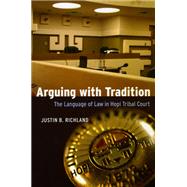
Arguing with Tradition: The Language of Law in Hopi Tribal Court
by Richland, Justin B.-

This Item Qualifies for Free Shipping!*
*Excludes marketplace orders.
Buy New
Rent Textbook
Rent Digital
Used Textbook
We're Sorry
Sold Out
How Marketplace Works:
- This item is offered by an independent seller and not shipped from our warehouse
- Item details like edition and cover design may differ from our description; see seller's comments before ordering.
- Sellers much confirm and ship within two business days; otherwise, the order will be cancelled and refunded.
- Marketplace purchases cannot be returned to eCampus.com. Contact the seller directly for inquiries; if no response within two days, contact customer service.
- Additional shipping costs apply to Marketplace purchases. Review shipping costs at checkout.
Summary
Author Biography
Table of Contents
| List of Illustrations | p. ix |
| Acknowledgments | p. xi |
| Introduction: Arguing with Tradition in Native America | p. 1 |
| The Ironies of Indigeneity | p. 1 |
| Native American Tribal Law and Tradition | p. 3 |
| "Anglo" Law in Indian Country: Courts of Indian Offenses | p. 8 |
| Tribal Courts Today: At the Edge of Tribal Sovereignty | p. 12 |
| The Dearth of Ethnographies of Tribal Courts | p. 17 |
| The Approach and Aims of This Study | p. 22 |
| An Outline of This Study | p. 23 |
| Making a Hopi Nation: "Anglo" Law Comes to Hopi Country | p. 27 |
| Hopi Tribal Governance | p. 32 |
| Hopi Village Organization and Governance | p. 34 |
| Court Comes to Hopi Country | p. 37 |
| The Hopi Tribal Court Today | p. 41 |
| Data and Methodologies: Talking Tradition in Hopi Property Disputes | p. 52 |
| "What are you going to do with the village's knowledge?" Language Ideologies and Legal Power in Hopi Tribal Court | p. 59 |
| Legal Discourse Analysis and Legal Power | p. 61 |
| Language Ideologies, Metadiscourse, and Metapragmatics | p. 64 |
| Talking Tradition, Talking Law in Hopi Courtroom Interactions | p. 66 |
| The Language Ideologies of Anglo-American Law versus Hopi Traditional Authority | p. 79 |
| Conclusion | p. 86 |
| "He could not speak Hopi.... That puzzle- puzzled me": The Pragmatic Paradoxes of Hopi Tradition in Court | p. 89 |
| Paradox in the Pragmatics of Language and Law | p. 92 |
| Discourses of Cultural Difference in Hopi Court | p. 97 |
| Iterations of Indigeneity in a Hopi Court Hearing | p. 100 |
| Conclusion | p. 112 |
| Suffering into Truth: Hopi Law as Narrative Interaction | p. 115 |
| Legal Narrativity in and out of Court | p. 116 |
| A Model of Hopi Law as Narrative Interaction | p. 120 |
| The Significance of Settings: Judicial Openings of Hopi Courtroom Narrative | p. 122 |
| The Contested Narrativity of a Hopi Property Proceeding | p. 128 |
| Conclusion | p. 142 |
| Conclusion: Arguments with Tradition | p. 147 |
| Tradition, Culture, and the Politics of Authenticity | p. 150 |
| The "Politics" of Multiculturalism and Native Culture | p. 154 |
| Arguing with Tradition | p. 157 |
| Notes | p. 163 |
| References | p. 169 |
| Index | p. 179 |
| Table of Contents provided by Ingram. All Rights Reserved. |
An electronic version of this book is available through VitalSource.
This book is viewable on PC, Mac, iPhone, iPad, iPod Touch, and most smartphones.
By purchasing, you will be able to view this book online, as well as download it, for the chosen number of days.
Digital License
You are licensing a digital product for a set duration. Durations are set forth in the product description, with "Lifetime" typically meaning five (5) years of online access and permanent download to a supported device. All licenses are non-transferable.
More details can be found here.
A downloadable version of this book is available through the eCampus Reader or compatible Adobe readers.
Applications are available on iOS, Android, PC, Mac, and Windows Mobile platforms.
Please view the compatibility matrix prior to purchase.